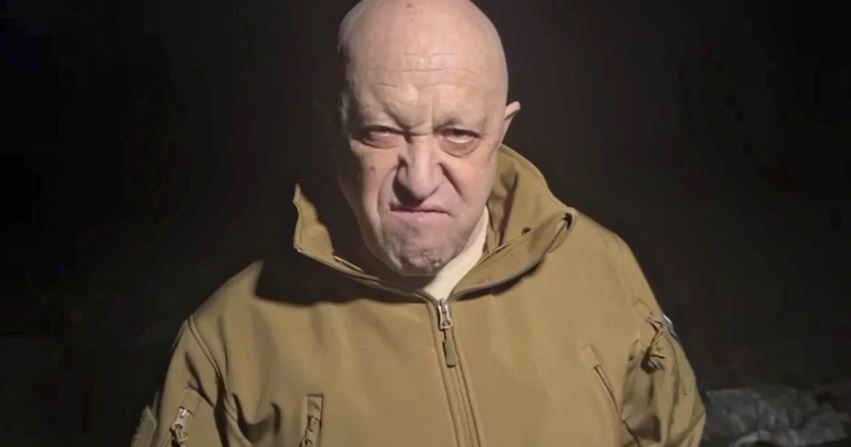Yevgeny Prigozhin, the man in control of the Wagner private military company, has instigated an armed rebellion that he likely sees as a necessity for his survival, reports the Institute for the Study of War (ISW). The Wagner forces have been integral to Prigozhin's efforts to become a leading figure in the Russian ultranationalist movement, and they've also provided him with a shield from potential repercussions due to his bold criticism of Russian leadership. This is due to Wagner's critical role in the ongoing war in Ukraine.
Prigozhin, in fact, capitalized on the achievements of the Wagner forces in and around Bakhmut, Ukraine, to lobby for more influence and responsibility. However, the strategic importance of Wagner started waning after the company was pulled back to the rear following the capture of Bakhmut on 21 May 2023.
The Ministry of Defense (MoD) of Russia, seizing this opportunity, has made a move to incorporate Wagner forces under its umbrella. As ISW reports, the ministry's call for subordination or face illegality put Prigozhin in a precarious position where he could lose his independent military structure, a significant source of influence, and a shield from potential fallout from his public self-promotion.
In an attempt to maintain Wagner's independence, Prigozhin reportedly proposed a contract delineating the collaboration between the MoD and Wagner. However, the MoD unequivocally rejected this overture. The impasse likely led Prigozhin to the precipice of a difficult choice - surrendering his independent armed forces or actively resisting the MoD. The risks of launching an armed rebellion indicate Prigozhin viewed his alternatives as equally threatening.
According to ISW, Prigozhin's plan was likely to secure the support of high-ranking Russian officers and military personnel, but his chances appear slim. This was underlined by the public denouncement of Prigozhin's call for rebellion by Army General Sergei Surovikin, a high-profile ally of Wagner.
Prigozhin's call to arms relied heavily on leveraging longstanding complaints about the high Russian casualties in Ukraine, accusing Defense Minister Sergei Shoigu and Chief of the General Staff Valery Gerasimov of sacrificing thousands of Russian personnel unnecessarily. However, the absence of independent access to the required military equipment, and the lack of substantial support within the Russian military establishment, seem to limit the chances of Prigozhin's rebellion gaining traction.
Indeed, the rejection by Surovikin, whom Wagner reportedly relied on for access to supplies and operational responsibilities in Bakhmut, deals a significant blow to Wagner's ability to muster support from the MoD. Other high-ranking officers with Wagner affiliations and sympathies are less likely to back Wagner in light of this public rejection by a well-known senior officer like Surovikin.
According to the Institute for the Study of War (ISW), Yevgeniy Prigozhin's intended armed rebellion against the Russian Ministry of Defense (MoD) is likely to face significant opposition from President Putin. The institute suggests that even if the Wagner Group, led by Prigozhin, were able to effect a change in military leadership, Putin is unlikely to accept such an outcome. The likelihood of Prigozhin's move being merely a rhetorical one is dismissed by ISW due to signs of actual Wagner movements.
It's more probable that Prigozhin plans to forcibly remove the MoD leadership from power, possibly targeting the Southern Military District command in Rostov-on-Don. Such an attack could significantly impact Russia’s war efforts in Ukraine, due to Rostov-on-Don's central role in command and control for the Russian army.
Wagner coup in detail
In the night of 23 June, Wagner financier Yevgeny Prigozhin accused the Russian MoD of striking a Wagner camp and announced a “march for justice,” vowing to “stop” Moscow’s top military leadership.
Russia’s official bodies denied any accusations of a strike on Wagner’s rear; the Russian FSB opened
a criminal case against Prigozhin and Russia’s top brass called upon Wagner fighters to defy Prigozhin’s orders.
In the morning of 24 June, Prigozhin, who started his career as "Putin's chef," claimed control over military objects in Rostov-on-Don, a city that serves as the headquarters for Russia’s war efforts in Ukraine, stating that the Chief of General Staff ran away when he saw Wagner fighters approaching.
A conflict between Prigozhin and the Russian MoD has been months in the making, and Russian military leaders have sought to limit the role of the leader of Wagner, a private military company that has played a key role in Russia’s assault on Ukrainian cities.
Prigozhin had defied a demand by Russian Defense Ministry that Wagner Group members sign contracts directly, highlighting a deepening conflict within the Russian establishment. Instead, Prigozhin drafted his own “contract” and said he was awaiting an answer from Russia’s military leadership for it. Meanwhile, the deadline for the volunteer fighters to sign contracts with the MoD, 1 July, “is likely to be a key way-point in the feud,”
the British intelligence assessed.
Vladimir Putin has vowed to stop the "armed rebellion" of Yevgeny Prigozhin.
Wagner's columns are reportedly moving on Moscow after bypassing Voronezh.
The UK Intelligence has called Prigozhin's uprising the greatest recent challenge to the Russian state.
Prigozhin has refused to lay down arms and said that Wagner mercenaries were the true "patriots" of Russia.
The Russian media outlet Vazhnye Istorii wrote, referring to its sources in the Presidential Administration, that the Kremlin tried to negotiate with Prigozhin but got rejected.



